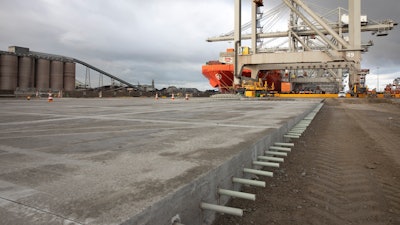High-Performance Composites for Eco-Friendly Building
Exploring the Uses and Advantages of Recycled Composites in Modern Industries
In today's rapidly developing industrial landscape, the use of recycled composites has actually gathered raising interest for its potential to redefine traditional manufacturing techniques. The combinations of recycled products with innovative composite innovations offers an appealing method for enhancing sustainability, resilience, and cost-efficiency across various sectors. As industries seek innovative options to deal with ecological issues and enhance functional effectiveness, the incorporation of recycled composites arises as a compelling option. This shift in the direction of lasting methods not only lines up with international conservation efforts but likewise offers a myriad of advantages that hold the key to forming the future of modern manufacturing methods.
Ecological Benefits of Recycled Composites
The application of recycled composites in contemporary markets uses substantial environmental benefits, adding to the decrease of waste and the preservation of natural deposits. By incorporating recycled compounds right into making processes, industries can lower their dependence on virgin materials, consequently reducing the amount of waste created and the energy needed for extraction and production. This shift in the direction of utilizing recycled composites helps in drawing away materials from landfills, minimizing the burden on waste management systems, and decreasing greenhouse gas emissions connected with typical manufacturing techniques.
Additionally, making use of recycled composites promotes the conservation of natural deposits such as hardwood, minerals, and water, which are frequently diminished with the extraction and handling of basic materials (composites). By prolonging the lifespan of materials via recycling, markets can help maintain ecological communities and biodiversity by lowering the need for brand-new sources. Overall, the fostering of recycled compounds in modern sectors plays an essential duty in promoting sustainability and mitigating the ecological impact of manufacturing processes
Improved Sturdiness in Product Manufacturing
With a focus on durability and toughness, including recycled composites right into product manufacturing processes boosts longevity and sustainability. By making use of recycled compounds, makers can produce products that are not only strong however additionally immune to deterioration, making them ideal for long-lasting use in different markets. The mix of various materials in recycled compounds can frequently result in improved stamina and longevity contrasted to typical materials, supplying a cost-effective remedy for creating durable goods.
One of the crucial benefits of making use of recycled composites in product production is the ability to customize the product buildings to meet particular longevity requirements. By changing the make-up and manufacturing methods, manufacturers can tailor the recycled compounds to hold up against rough ecological conditions, heavy lots, or regular usage without compromising on performance. This flexibility in layout and production allows for the creation of extremely sturdy products that preserve their honesty in time, reducing the requirement for regular replacements and eventually contributing to a much more sustainable manufacturing procedure.
Cost-Effectiveness and Financial Benefits
Including recycled composites into product production not just improves resilience and sustainability but likewise supplies substantial cost-effectiveness and financial advantages. Making use of recycled composites can cause decreased product costs as recycled materials are often cheaper than virgin products. In addition, recycling composite materials can reduce waste disposal expenditures and decrease the demand for landfill area, adding to general price financial savings for markets.

Technology and Layout Versatility With Recycled Composites
Utilizing recycled composites in modern-day markets provides unmatched chances for development and layout versatility. By incorporating recycled products into composite production processes, companies can press the borders of standard design constraints and discover new possibilities. The convenience of recycled compounds enables for the creation of complex shapes and frameworks that could not be attainable with traditional materials.
One of the vital advantages of recycled composites is their capability to be built into different kinds, providing developers the liberty to trying out special sizes and shapes. composites. This adaptability opens a globe of creative possibilities, enabling the growth of light-weight yet durable items that satisfy the particular needs of various sectors
Furthermore, using recycled compounds promotes sustainable techniques and sustains the circular economic situation by decreasing waste and minimizing the environmental influence of producing procedures. This emphasis on environment-friendly design remedies lines up with the growing trend towards sustainability in modern markets, making recycled compounds a valuable source for forward-thinking and cutting-edge business.
Applications Throughout Numerous Industries
Recycled compounds locate varied and impactful applications throughout a wide array of industries due to their one-of-a-kind residential or commercial properties and sustainability benefits. The aerospace sector benefits from recycled composites in the production of aircraft parts, where the products' strength-to-weight proportion is crucial for ensuring security and performance. The versatility and sustainability of recycled compounds make them useful throughout numerous sectors, driving technology and ecological stewardship.
Verdict
Finally, the application of recycled compounds in contemporary markets provides significant ecological benefits, enhanced longevity in item production, cost-effectiveness, and economic advantages. The usage of recycled compounds enables for advancement and layout flexibility across numerous markets. On the whole, the adoption of recycled composites presents a sustainable and useful service for meeting the requirements of the industry while also lowering environmental influence.

One of the essential advantages of using recycled composites in product manufacturing is the ability to customize the product homes to satisfy details toughness requirements. Using recycled compounds this can lead to minimized product prices as recycled materials are commonly less pricey than virgin products. The aerospace sector advantages from recycled compounds in the production of airplane components, where the materials' strength-to-weight ratio is critical for guaranteeing security and performance.